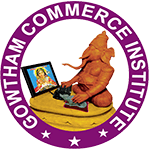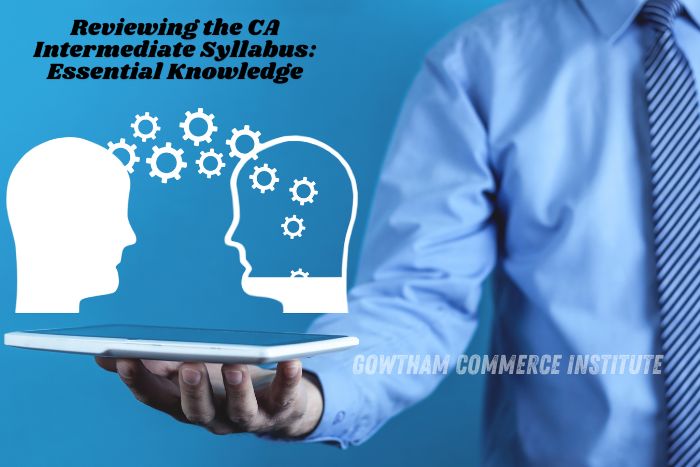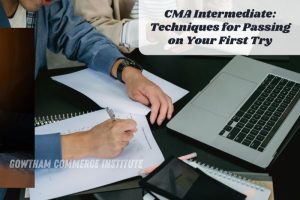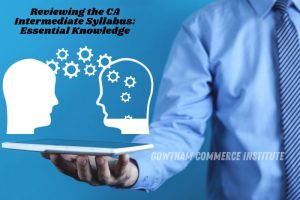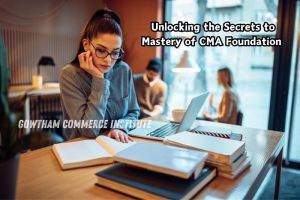The second level of the Chartered Accountancy course, the CA Intermediate Exam opens doors to advanced knowledge and useful accounting, auditing, tax, and more practical skills. Success on this test calls not only diligence but also a strategic preparation schedule and a clear grasp of the syllabus.
For more than ten years, Gowtham Commerce Institute which is situated in Peelamedu, Coimbatore has been helping CA aspirants. Examining the CA Intermediate syllabus in great detail, this blog breaks out the topics and subjects you must become proficient in and offers advice on how to excel.
1. Overview of the CA Intermediate Exam
There are two groups to the CA Intermediate Exam, each with four papers. Depending on their degree of preparation, students could try one group at a time or both together.
Key Features of the Exam:
1. Students who opted for the Direct Entry Route or have cleared CA Foundation are eligible.
2. Exam structure combines objective and subjective questions.
3. Minimum 40% marks in each paper and an overall group mark total of 50%.
4. Crashing the test starts with knowing the syllabus. Let’s explore the specifics.
2. Group I: Subjects and Key Topics
1. Accounting (Paper 1)
The emphasis of this topic is advanced accounting ideas and standards.
Key Topics:
1. Accounting standards (AS 1 to AS 29).
2. Partnership accounts, including admission, retirement, and dissolution.
3. Preparation of financial statements for sole proprietors and companies.
4. Amalgamation and reconstruction of companies.
Tips to Excel:
1. Focus on mastering accounting standards.
2. Practice numerical problems daily.
3. Use charts and tables for quick reference during revision.
2. Corporate and Other Laws (Paper 2)
This paper is divided into two sections:
1. Section A: Company Law
2. Section B: Other Laws
Key Topics:
1. The Companies Act, 2013: Incorporation, management, and winding up
2. The Indian Contract Act, 1872
3. The Negotiable Instruments Act, 1881
4. The General Clauses Act, 1897
Tips to Excel:
1. Memorize key sections and provisions.
2. Practice case studies to understand the practical application of laws.
3. Create summary notes for quick revision.
3. Cost and Management Accounting (Paper 3)
This paper gauges your knowledge of management accounting concepts and costing methods.
Key Topics:
1. Marginal costing and decision-making
2. Budgetary control and standard costing
3. Job and contract costing
4. Process costing
Tips to Excel:
1. Solve numerical problems regularly to improve speed and accuracy.
2. Focus on decision-making tools, as they carry significant weightage.
3. Revise formulas frequently to retain them.
4. Taxation (Paper 4)
This paper is divided into two sections:
1. Section A: Income Tax
2. Section B: Indirect Taxes (GST)
Key Topics:
1. Residential status and scope of total income
2. Heads of income salaries, house property, business, and capital gains
3. GST provisions input tax credit, registration, and tax invoice
4. Filing of returns and payment of taxes
Tips to Excel:
1. Stay updated on the latest amendments in tax laws.
2. Practice filing mock returns to familiarize yourself with real-world applications.
3. Focus on GST provisions, as they are highly scoring.
3. Group II: Subjects and Key Topics
1. Advanced Accounting (Paper 5)
This work expands on Group I accounting ideas.
Key Topics:
1. Amalgamation, absorption, and internal reconstruction
2. Accounting for banking, insurance, and electricity companies
3. Valuation of goodwill and shares
4. Partnership accounts retirement and dissolution
Tips to Excel:
1. Understand the concepts of valuation thoroughly.

2. Practice problems related to banking and insurance accounting.
3. Use examples to clarify complex concepts.
2. Auditing and Assurance (Paper 6)
The topics of this course center on auditing techniques, standards, and concepts.
Key Topics:
1. Audit planning, risk assessment, and internal controls
2. Standards on Auditing (SA)
3. Audit of various entities: Banks, insurance companies, and non-profits
4. Audit reports and certifications.
Tips to Excel:
1. Memorize important standards on auditing and their applicability.
2. Practice writing audit reports to improve presentation.
3. Focus on risk-based auditing techniques.

3. Enterprise Information Systems (EIS) and Strategic Management (SM) (Paper 7)
This paper is divided into two sections:
1. Section A: Enterprise Information Systems
2. Section B: Strategic Management
Key Topics:
EIS: Data analytics, knowledge systems, and business processes
Strategic decisions, SWOT analysis, and competitive strategies SM
Tips to Excel:
1. Simplify IT procedures with flowchart and diagram support.
2. To appreciate practical applications in strategic management, study case studies in that field.
3. Pay especially attention to risk management and IT controls.
4. Financial Management and Economics for Finance (Paper 8)
This work aggregates economic ideas with financial management ideas.
Key Topics:
1. Financial analysis and planning ratio analysis, working capital management.
2. Capital budgeting and cost of capital.
3. Micro and macroeconomics market structures, demand, and supply.
4. International trade and public finance.

Tips to Excel:
1. Practice numerical problems regularly.
2. Focus on high-weightage topics like capital budgeting.
3. Relate economic concepts to current market trends.
4. Study Strategies for Success
a) Prioritize High-Weightage Topics
To get the best mark, concentrate on subjects with more mark allocation.
b) Use Time Management Tools
Spend your study time wisely distributing among all the disciplines. Help comes from tools like Pomodoro timers and Google Calendar.
c) Practice Mock Tests
Mock exams help you to better manage your time and familiarize you with the exam pattern. We at Gowtham Commerce Institute give thorough comments and frequent mock tests to enable students to shine.
d) Stay Consistent
Mastery of the syllabus depends on consistency. Set aside specific hours each day for study and revision.
5. Why Choose Gowtham Commerce Institute in Peelamedu, Coimbatore?
We at Gowtham Commerce Institute offer thorough coaching for the CA Intermediate Exam to make sure students are confident and ready. We provide as follows:
1. Our experienced faculty uses real-world examples to streamline difficult subjects.
2. ICAI-aligned research tools and succinct notes comprise comprehensive resources.
3. Frequent tests help to monitor development and improve strategies.
4. Customized attention small batches let us handle unique problems.
6. Conclusion: Your Path to Success
Examining the CA Intermediate calls for commitment, strategic planning, and professional direction. Knowing the syllabus, focusing on high-weightage topics, and consistent practice will help you to fulfill your goals and advance to the next level of your CA road.
We are here at Gowtham Commerce Institute, Peelamedu, Coimbatore, to guide you through each level. Using our tried-and-true teaching approaches, seasoned teachers, and motivating classroom environment has helped many students succeed.
Are you ready to progress to chartered accountant?
Come see Gowtham Commerce Institute now to begin your road toward success!
